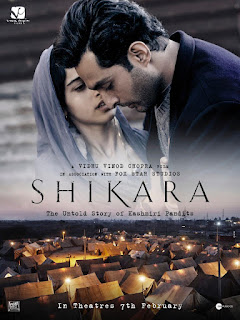Johnson Thomas
An eye-pleasing, sentimental love story

Film: Shikara
Cast: Aadil Kahn, Sadia, Faisal Simon, Priyanshu Chatterjee
Director: Vidhu Vinod Chopra
Rating: * * *
Runtime: 120 mins

Tripping all through on Bollywood tropes made memorable by the likes of Yash Chopra, Vidhu Vinod Chopra’s latest directorial, that markets itself as a refugee story is anything but. Inspired by Rahul Pandita’s ‘Our Moon Has Blood Clots,’ the film has its pivotal characters coming from that Kashmiri Pandit refugee space but the central over-riding theme here is one of abiding, enduring love - the ‘Buniyaad’ kind. So from the early 1980 right up to 2018 Chopra takes us to Kashmir and Jammu, as Shiv Kumar Dhar( Aadil Khan) and Shanti(Sadia) meet up as happenstance extras on a film set, progress to falling in love, getting married and setting up home and hearth in the valley once eulogised as Paradise on earth. While their love for each other remains unstinted, their displacement from the known to the unknown becomes a cause for unmitigated grief. The two are forced to flee Kashmir as part of the exodus of Pandits from the valley in 1980, live in refugee camps for a while and then move to a small but more permanent refugee quarter. Woven into their love story are the tragedies of Lateef( Faisal Simon), Dr Navin Zutshi (Priyanshu Sharma) and Aarti whose lives are tossed asunder by the passions unleashed by communal strife.

Chopra’s mellow narrative briefly lets in some well-chosen news stories, documentary footage and sloganeering as emblematic representations of that period. But for those unaware of the true nature or reason for that violence, it is quite unlikely that they will become better aware after watching this film. And it’s never made clear as to why Kashmiri pandits never chose to visit their homeland (post the displacement) - even when local and foreign tourists were visiting the state, albeit in smaller numbers. The loving couple, are shown as doing quite well for themselves eventually. Shiv takes on the job of a Professor with a decent salary -enough to fulfil his wife’s only wish.

In order to highlight the disregard shown for the Pandits by the Political class and the International community, Chopra has Shiv writing regular letters to the President of America – in the hope that he would one day arouse the conscience of the world and be the harbinger of justice for the aggrieved Pandits. That unbelievable conceit doesn’t sit well within the narrative and seems a little too preposterous to be believable. Chopra could have dreamed up a more potent construct to frame his narrative around. The screenplay by Chopra, Pandita and Abhijat Joshi doesn’t do enough justice to the Pandits’s story – focused as it is on syrupy romance. Some of the ‘nazms’ especially ‘Umr Guzri’ recited as part of Shiv’s poetry are particularly poignant and does more to bring home the aching loss of displacement from home and Kashmir with far more potency than the actors or the mushy romance that superimposes itself on the narrative here. Rangarajan Ranabadran’s vivid cinematography, Aadil, Sadia, Faisal Simon’s heart-touchingly sincere performances, Priyanshu’s riding-on-flamboyance presence, the motley mix of classical and folk in the background orchestrations and the haunting melancholy of ‘Jo ek pal tumko…Mar Jaayein hum’ rendered beautifully by Shradha Mishra and Papon leave the most lasting impression here.

Johnsont307@gmail.com
No comments:
Post a Comment